Play is a powerful tool for boosting cognitive development in children with cerebral palsy. Sensory-rich games, adaptive puzzles, and interactive technology enhance neural connections while accommodating motor limitations. Multi-sensory activities engage different brain regions simultaneously, strengthening mental capabilities beyond what traditional therapy offers alone. Combine structured and unstructured play for maximum benefit, using everyday items and technology to create personalized challenges. Consistent cognitive play integrated into daily routines can transform therapeutic outcomes in ways you’ll soon discover.
Understanding Cognitive Development in Cerebral Palsy
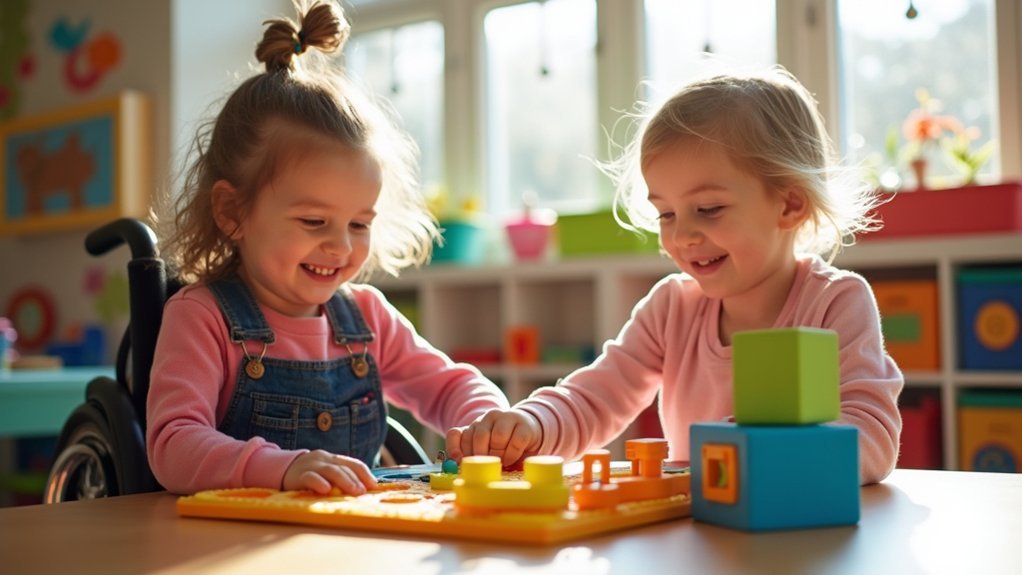
While cerebral palsy is primarily recognized as a motor disorder, cognitive development plays an equally important role in a child’s overall functioning and quality of life.
You’ll find remarkable variability in cognitive abilities across children with cerebral palsy, ranging from no impairment to significant challenges.
It’s essential to understand that motor limitations can mask true cognitive potential. Many children with severe physical impairments have underestimated intellectual abilities due to assessment difficulties.
Each cerebral palsy subtype—spastic, dyskinetic, and ataxic—presents distinct cognitive profiles that require different approaches to learning and development.
Remember that early brain injuries affect cognition differently based on location and severity.
Physical functioning, especially abilities like standing independently, often correlates with cognitive development but doesn’t determine it. Research shows that children with more severe physical disabilities typically experience a higher prevalence of cognitive impairment compared to those with milder motor symptoms.
The Power of Playful Learning for Brain Development
When children engage in play, their brains light up with activity that strengthens neural connections and builds cognitive pathways essential for development. This neurological stimulation is particularly beneficial for children with cerebral palsy, as it enhances brain-to-brain synchronization during guided interactions.
You’ll see greater learning outcomes when you participate in your child’s play rather than leaving them to explore independently. This guided approach stimulates the development of a prosocial brain, improving your child’s emotional intelligence and social skills.
Both structured and unstructured play serve important functions in cognitive development. While free play encourages creativity, guided play provides focused learning opportunities that develop problem-solving abilities and 21st-century skills. Research shows that play-based learning experiences that are joyful and meaningful lead to better information retention and deeper engagement.
Incorporating playful learning into daily routines can greatly improve your child’s brain function and academic potential.
Sensory-Rich Games That Enhance Cognitive Function
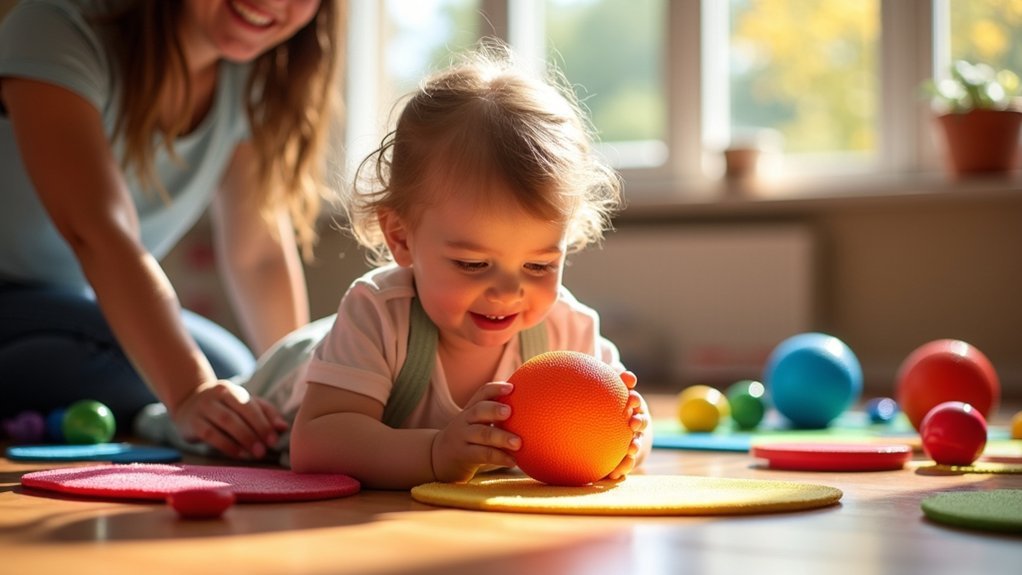
Sensory-rich games offer a powerful extension of playful learning by actively engaging multiple sensory pathways simultaneously. When your child combines touch, sight, and sound during play, they’re actually forming stronger neural connections that enhance memory retention and problem-solving abilities.
Consider multi-sensory toys that incorporate varied textures, sounds, and visual elements—research shows these increase engagement and produce better learning outcomes than single-sense alternatives. These activities promote cognitive skills development through repeated exploration and classification of objects with different characteristics.
Multi-sensory toys enrich learning by engaging multiple senses simultaneously, creating deeper neural pathways than their single-sense counterparts.
Even video games can provide valuable cognitive stimulation, with studies revealing that interactive gaming activates frontal brain regions responsible for higher-level thinking.
You’ll notice improved attention spans and cognitive flexibility as your child explores sensory-rich environments.
Problem-Solving Puzzles for Motor and Mental Growth
Tactile puzzles help your child form neural connections while developing essential finger strength needed for future writing skills.
Shape sorters challenge your youngster to match, classify, and reason through spatial relationships, building cognitive pathways that transfer to mathematical thinking.
When you introduce sequencing games, you’ll notice improvements in your child’s ability to plan ahead, understand cause-effect relationships, and execute multi-step problem solving. These puzzles can be adapted with simple modifications like elastic bands or sticks to accommodate your child’s specific motor abilities.
Tactile Puzzles Build Connections
Through exploration of three-dimensional puzzles and textured materials, children with cerebral palsy can develop critical neural pathways that enhance both cognitive function and fine motor skills.
When your child manipulates tactile puzzles, they’re engaging multiple brain areas simultaneously. The combination of visual and touch feedback strengthens neural connections, promoting better sensory-motor integration. You’ll notice improvements in their hand-eye coordination and spatial reasoning as they practice.
These puzzles provide immediate sensory feedback that stimulates neural plasticity—the brain’s ability to reorganize itself. Each time your child grasps, turns, and places puzzle pieces, they’re reinforcing pathways responsible for touch and proprioception. Sensory integration therapy can be particularly effective when incorporated into these puzzle activities, providing diverse sensory experiences that support development.
This repeated practice doesn’t just build motor skills; it enhances executive functioning, attention, and problem-solving abilities essential for daily activities and greater independence.
Shape Sorters Boost Reasoning
Shape sorters represent a simple yet powerful tool for advancing your child’s cognitive abilities beyond basic recognition skills. They develop critical thinking as your child matches shapes to corresponding slots, building problem-solving and spatial awareness simultaneously. Successful completion of these activities creates valuable moments that foster a sense of achievement in toddlers.
| Skill Area | Benefits | Activities |
|---|---|---|
| Cognitive | Pattern recognition, cause-effect understanding | Name shapes while sorting |
| Physical | Fine motor skills, hand-eye coordination | Guide hands to manipulate pieces |
| Social | Communication practice, vocabulary growth | Take turns sorting different shapes |
When you introduce shape sorters into playtime, you’re helping your child develop dexterity and muscle strength in their hands. The visual discrimination required helps them differentiate between colors and shapes, while the repeated practice strengthens visual memory. These seemingly simple toys create perfect opportunities for interactive dialogue that expands language skills through naming and describing.
Sequencing Games Advance Planning
Sequencing games provide powerful tools for cultivating planning abilities in children with cerebral palsy, addressing both cognitive and motor challenges simultaneously.
When your child engages with step-by-step activities, they’re developing critical thinking and decision-making skills essential for everyday problem-solving. These structured tasks improve cognitive processing and visual memory—areas where kids with CP often need extra support. Games with adjustable difficulty levels allow for personalized progression that matches each child’s unique capabilities.
You’ll notice enhanced motor coordination as they physically interact with game elements, bridging the gap between thinking and doing.
Beyond individual development, sequencing activities foster social interaction through collaborative play, encouraging communication and emotional intelligence.
The benefits extend far beyond immediate gameplay, supporting long-term cognitive growth and social skill development that translates to real-world success.
Interactive Technology Games for Cognitive Stimulation
Interactive digital platforms now offer unprecedented cognitive benefits for children with cerebral palsy through adaptive apps that adjust to your child’s specific abilities and needs.
Touchscreen learning adventures can transform therapy into engaging play sessions that simultaneously stimulate motor skills and mental processing.
Virtual reality cognitive games create immersive environments where your child can safely practice real-world skills while strengthening neural connections involved in memory, attention, and problem-solving.
Research shows dual-task training can significantly enhance rehabilitation outcomes by combining balance exercises with cognitive challenges, leading to greater improvements in both motor and mental functions.
Adaptive Apps Unlock Potential
The digital revolution in healthcare has ushered in a new era of cognitive stimulation through adaptive applications specifically designed for individuals with cerebral palsy. Among the 63 mobile applications identified, 40 offer promising potential for CP management and therapy.
These innovative apps detect hand and head movements, enabling children with limited mobility to communicate more effectively while simultaneously stimulating motor skills.
Children aged 7-12 have already experienced reduced therapy duration through pictogram-based communication tools that make learning more accessible.
You’ll find these applications particularly beneficial for early intervention, as research shows younger children with better baseline cognitive function demonstrate greater improvements. Artificial intelligence integration could help address the shortage of professionals in rehabilitation education for children with CP.
While further validation is needed, these adaptive technologies represent a significant advancement in making cognitive stimulation engaging, personalized, and accessible for your loved one with cerebral palsy.
Touchscreen Learning Adventures
Touchscreen devices have revolutionized cognitive stimulation for individuals with cerebral palsy, building upon the foundation laid by adaptive applications. Through embodied learning, you engage physically with content, combining movement with visual feedback that enhances cognitive processes.
Interactive multitouch games offer real-time feedback and skill level adaptation, making learning more accessible regardless of your abilities. These serious games simulate practical scenarios like shopping, helping you develop skills you’ll use in everyday life.
You’ll likely experience improvements in processing speed and memory as you interact with these engaging platforms. The graphical representation of your progress keeps motivation high, while the instant feedback helps you adjust strategies. Recent studies show that interactive cognitive interventions produced superior memory improvements compared to traditional paper-and-pencil methods, particularly in delayed recall and recognition tasks.
Best of all, touchscreen technology makes cognitive stimulation inclusive, giving you opportunities to boost brain power through enjoyable, purposeful play.
Virtual Reality Cognitive Games
Stepping beyond touchscreen applications, virtual reality cognitive games offer an immersive dimension to brain power development for individuals with cerebral palsy.
These customizable experiences enhance both cognitive and motor functions while markedly boosting motivation and participation in rehabilitation therapy.
You’ll find VR particularly effective because it’s accessible across varied abilities and can be scaled as your child progresses.
The engaging nature of VR environments also improves therapeutic adherence, leading to more consistent developmental gains.
According to research by Wei Liu and colleagues, virtual reality interventions demonstrate significant improvements in balance function compared to traditional therapy methods for children with cerebral palsy.
Consider these compelling VR benefits:
- Improves balance and enhances both gross and fine motor skills with lasting effects
- Complements traditional rehabilitation methods with personalized interventions
- Creates real-world simulations that help your child adapt more effectively to everyday situations
VR’s immersive experiences are revolutionizing how children with CP develop essential life skills.
Adapting Classic Brain Games for Physical Limitations
While many traditional brain games rely on typical motor abilities, adapting these activities for individuals with physical limitations opens up valuable opportunities for cognitive development.
You can modify classic games using magnetic or velcro-based components to accommodate limited range of motion and gripping challenges. For example, transform darts into a child-friendly version that enhances aiming skills without physical risks.
Adjust parameters in movement games by creating safe zones in “Hot Lava” to support balance development. Smart balls designed for therapy can be incorporated to make these games even more engaging while they track progress and results for medical professionals. Incorporate creative sequences like secret handshakes to encourage cognitive planning alongside physical coordination.
Consider board games tailored to physical capabilities, which allow practice of strategic thinking while accommodating motor limitations. Focus on selecting activities that promote bending, stretching, and timing to simultaneously reinforce cognitive function and physical capacity.
Social Play Activities That Build Cognitive Skills
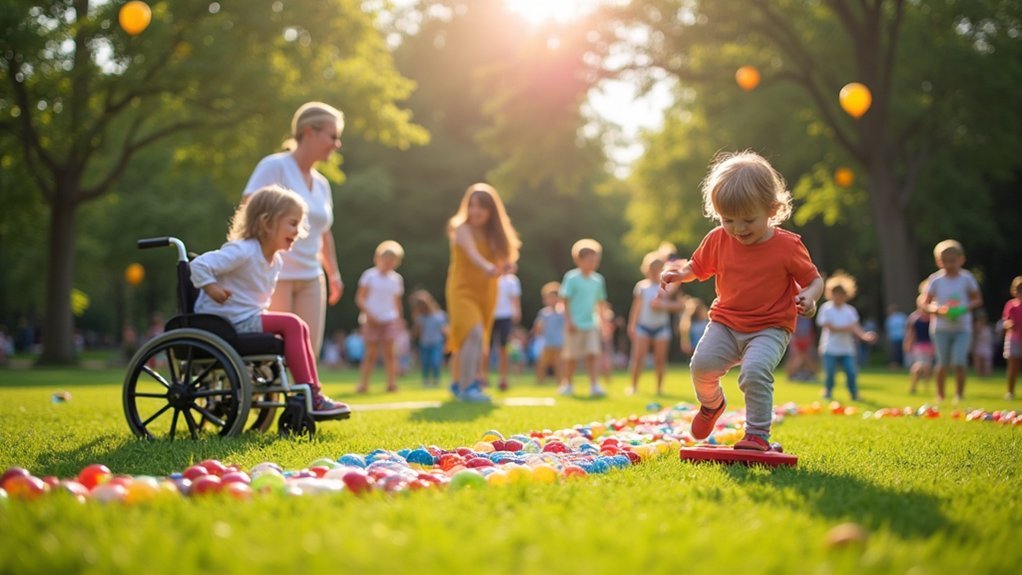
Engaging in social play creates powerful opportunities for children with cerebral palsy to develop essential cognitive abilities alongside interpersonal skills.
Social engagement serves as a developmental cornerstone, empowering children with cerebral palsy to flourish both cognitively and socially.
Through pretend play and role-playing activities, your child can express emotions, understand social cues, and build the foundation for meaningful relationships with peers.
Try these social activities to boost cognitive development:
- Interactive pretend play – Create scenarios where your child can practice different social roles, enhancing their understanding of relationships and emotional intelligence.
- Structured group activities – Join recreational therapy programs that build confidence while developing cooperation skills.
- Technology-supported interactions – Utilize communication apps and digital tools that help your child express themselves and connect with others when verbal communication is challenging.
These activities promote natural development of skills while creating an environment where children feel less different from their peers.
Creating Custom Cognitive Challenges at Home
As your child develops, crafting personalized cognitive challenges at home can greatly enhance their brain development while making learning feel like play. You’ll find that everyday items become powerful tools for cognitive growth when used creatively. Early intervention through sensory play activities has been shown to be crucial for development in children with cerebral palsy.
| Activity Type | Benefits |
|---|---|
| Sensory Bins | Improves tactile processing and object recognition |
| Modified Board Games | Enhances strategic thinking and social skills |
| Household Obstacle Courses | Develops spatial awareness and problem-solving |
| Sorting Activities | Strengthens categorization and pattern recognition |
| DIY Science Experiments | Builds cause-effect understanding and curiosity |
Try integrating technology like adaptive tablets for interactive learning experiences. For children with fine motor challenges, customize activities by using larger objects or adaptive tools. Remember that effective cognitive challenges should be enjoyable while providing just enough difficulty to encourage progress without frustration.
Memory and Attention-Building Exercises Through Play
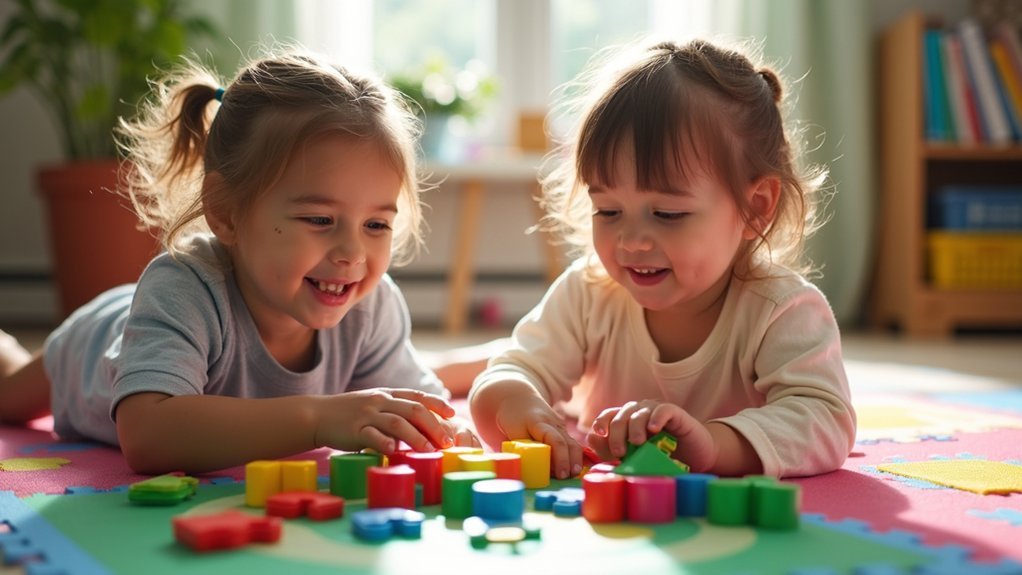
Memory and attention-building exercises through play offer powerful ways to enhance your child’s cognitive development while keeping the learning experience enjoyable.
Research shows that play-based cognitive activities can improve working memory, sustained attention, and visuo-spatial skills in children with cerebral palsy.
Try these engaging activities that target multiple cognitive domains:
- Pattern Recognition Games – Use colorful blocks or digital apps that challenge your child to identify and complete sequences, strengthening both memory and attention simultaneously.
- Memory Matching Cards – Customize difficulty levels by varying the number of cards to match your child’s abilities.
- Storytelling with Props – Have your child retell stories using toys, building attention span while exercising working memory.
These playful exercises can generalize to improved everyday functioning and seamlessly integrate into your daily routine. Digital training programs like CogMed have shown promising improvements in working memory skills for children with various neurological conditions.
Measuring Cognitive Progress Through Gameplay
Tracking your child’s cognitive development through structured play provides valuable insights into their learning journey while maintaining the fun factor. You can use established frameworks like the Bayley Scales or MACS to benchmark progress in specific cognitive domains.
Modern assessment approaches blend seamlessly with play activities. Consider monitoring improvements using gameplay metrics from VR applications or AI-integrated platforms that automatically track performance data. These tools measure attention span, problem-solving speed, and memory retention without disrupting the play experience.
For thorough evaluation, combine standardized tests like the Beery-Buktenica with observations during multisensory play sessions. Document how your child navigates social interaction games and physical activity challenges, which reflect cognitive growth in real-world contexts. The Gross Motor Function Measure (GMFM) can provide clinician-reported outcomes that specifically evaluate progress in motor skills during therapeutic play activities.
This balanced approach guarantees you’re capturing both quantitative improvements and qualitative developmental milestones.
Integrating Cognitive Play Into Daily Therapy Routines

Transforming therapy sessions into engaging play experiences creates powerful opportunities for cognitive development.
Play-based therapy transforms clinical interventions into cognitive growth opportunities while fostering joy and engagement.
You’ll find that structured activities can markedly improve your child’s attention and impulse control while making therapy feel less clinical. Involve family members to foster a supportive environment where your child can practice self-expression and emotional regulation. Play therapy provides a safe space for children with Cerebral Palsy to express their emotions and develop coping strategies.
For seamless integration into daily routines:
- Blend physical and cognitive exercises – Combine motor skill development with problem-solving activities to maximize therapeutic benefits.
- Establish consistent play times – Schedule regular cognitive play sessions with therapist guidance to build upon progress.
- Utilize adaptive equipment – Incorporate specialized tools that make play accessible while addressing specific developmental needs.
This approach not only enhances learning but also provides emotional support, reducing anxiety while making therapy something your child looks forward to.
Frequently Asked Questions
How Does Nutrition Impact Cognitive Development in Children With Cerebral Palsy?
Proper nutrition profoundly impacts your child’s cognitive development by providing essential nutrients like omega-3s, iron, and B12 that support brain function, while preventing nutritional deficiencies that can hinder cognitive growth despite cerebral palsy challenges.
Can Music Therapy Enhance Cognitive Function Alongside Play-Based Interventions?
Yes, music therapy can greatly enhance your child’s cognitive function when combined with play. You’ll see improvements in memory, attention, and emotional responses as these interventions create a powerful multisensory learning experience.
What Role Do Siblings Play in Cognitive Development Activities?
Siblings act as cognitive development catalysts by modeling language skills, participating in therapy sessions, and creating inclusive play opportunities. You’ll notice they’re natural teachers who boost communication abilities and foster engagement through everyday interactions.
How Does Sleep Quality Affect Cognitive Progress in Cerebral Palsy?
Poor sleep quality directly impacts your child’s cognitive progress. When they’re sleep-deprived, they’ll struggle with attention, learning, and memory. Improving their sleep can enhance cognitive function and development despite cerebral palsy challenges.
Can Cognitive Play Interventions Help Reduce Anxiety and Depression Symptoms?
Yes, cognitive play interventions can greatly reduce your anxiety and depression symptoms by providing nonverbal emotional expression, building coping skills, enhancing self-confidence, and creating positive interactions that improve your overall psychological wellbeing and resilience.
In Summary
By making cognitive play a cornerstone of your child’s daily routine, you’ll reveal significant brain development potential despite cerebral palsy challenges. You’re not just creating fun moments—you’re building neural pathways that strengthen cognition. Continue adapting activities to match your child’s progress, celebrating small victories along the way. Remember, every playful moment is rewiring their brain for greater function and independence in the future.

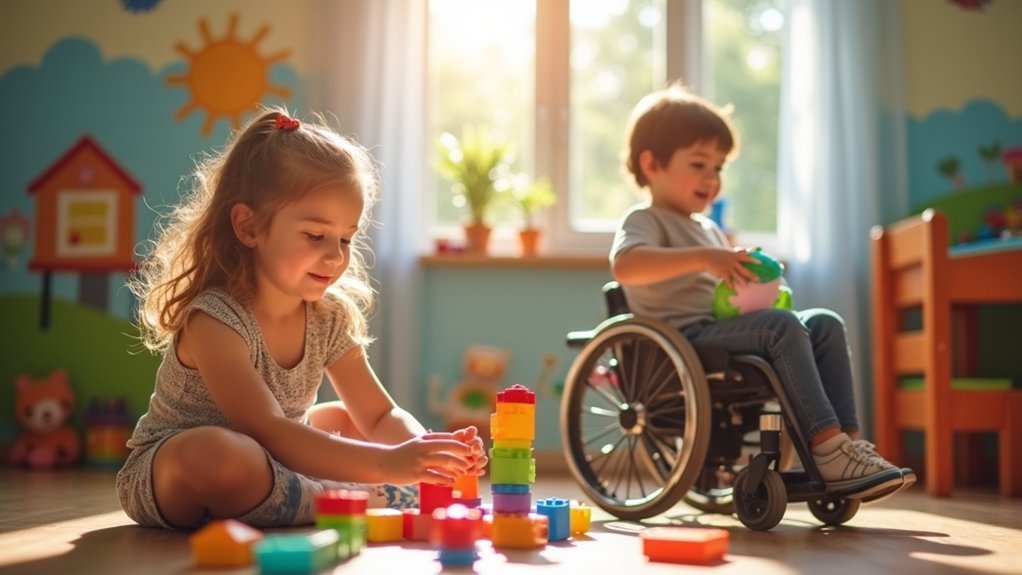

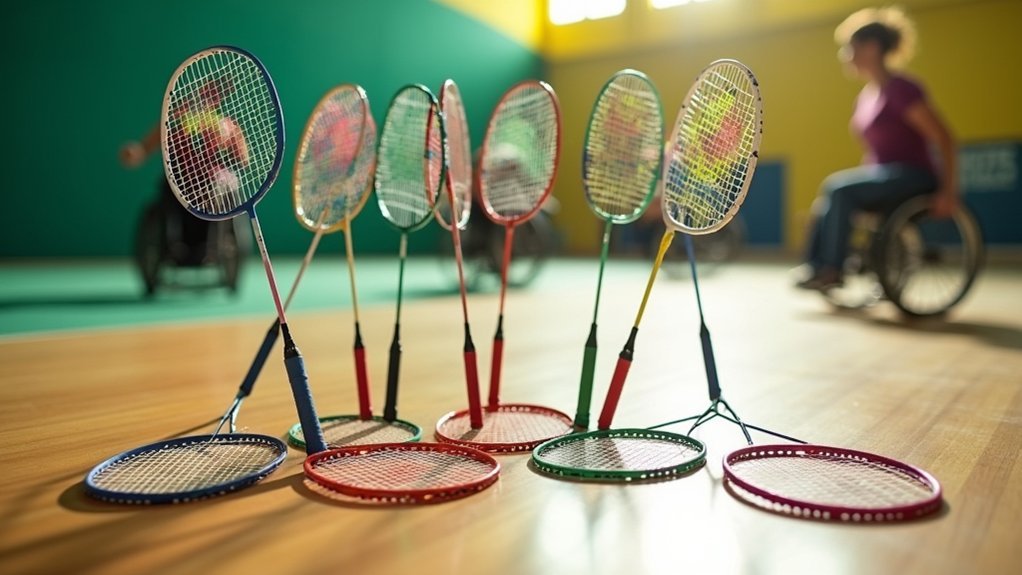

Leave a Reply